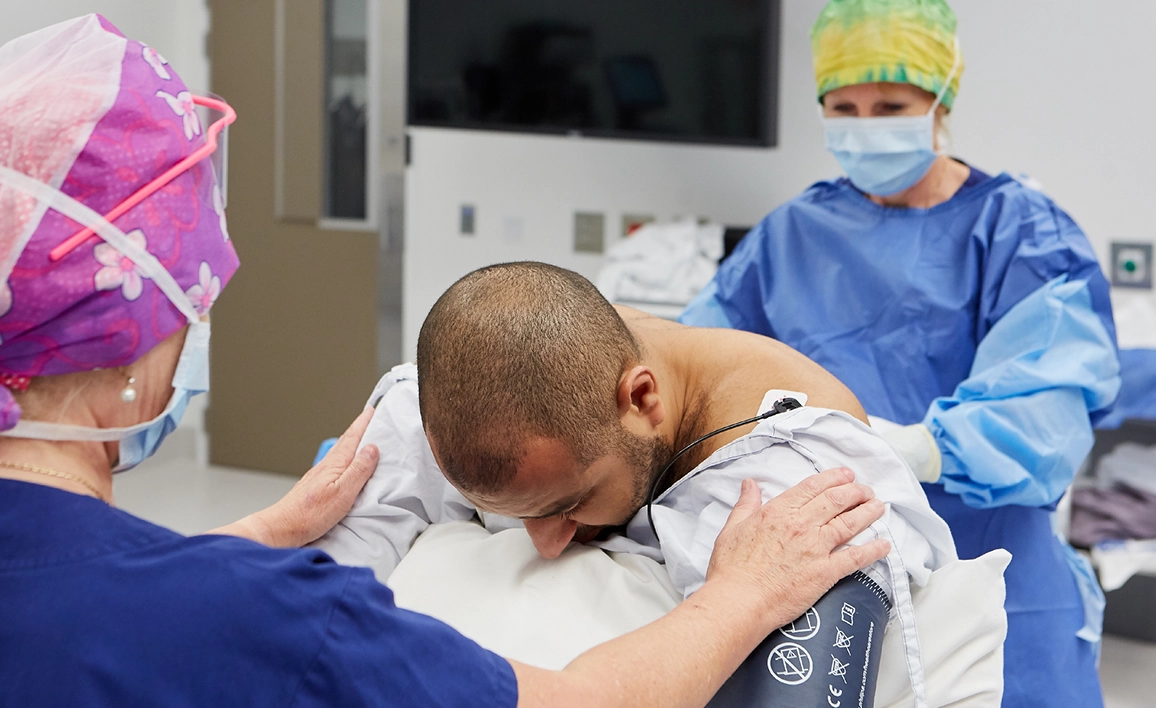The program will enable us to recognise our fellows' competence in providing safe and high quality care, encompassing the selection, performance and follow-up of procedures within the sociopsychobiomedical paradigm.
The process of endorsement involves fellows demonstrating their competency and adherence to the Procedures in Pain Medicine Clinical Care Standard, which articulates what is considered to be the appropriate and safe use of procedures in the practice of pain medicine.
The Practice Assessment Pathway closes at the end of 2026. This pathway is open to practicing FPM fellows with established experience in pain medicine procedures who seek endorsement in at least one recognised pain medicine procedure. Established experience is defined as:
- 3 years regular independent procedural experience post procedural training*
- May include procedural experience gained post procedural training prior to becoming an FPM fellow.
Newer fellows within 5 years of FFPMANZCA are expected to have had their PDS training in pain procedures in an FPM accredited unit/position to have this period counted towards endorsement (a minimum of 6 months at 0.5FTE procedural training).
* ‘Procedural training’ is a defined period where you were working under supervision, not just in theatre but also in clinic. The supervisor would normally be an FPM fellow. Your supervisor would have assessed your procedural skills to identify that you were able to practice unsupervised.
Attainment of FPM endorsement in pain medicine procedures may be pursued via one of the following pathways:
- Supervised Clinical Experience Pathway – which is open to PDS trainees and FPM fellows who elect to train ab-initio in nominated procedures.
- Practice Assessment Pathway – which is open until the end of 2026 to practising FPM fellows with established experience in pain medicine procedures.
The faculty has selected 21 procedures, which are established in practice and supported by evidence, for inclusion in the program. These procedures are listed in the Procedures Endorsement Program curriculum.
The procedures have been grouped into three categories that reflect the level of risk and complexity involved. When seeking endorsement, you may pursue one or more procedures that are relevant to your practice or interest, and there is no requirement to seek endorsement in all procedures or all categories.
It is important to note that the list of selected procedures is not comprehensive nor final. It will be reviewed regularly and may change over time, as more evidence is gathered for the clinical utility and harms of these and other procedures.
Faculty endorsement is not mandatory and has no regulatory implications. The faculty does not suggest limiting the scope of practice to the procedures selected for endorsement, and endorsed fellows may practise and pursue training in other procedures as they wish.
However, FPM fellows and trainees who perform pain procedures are encouraged to seek faculty endorsement of their procedural practice.
FPM trainees in the Practice Development Stage (PDS) can undertake the Procedures Endorsement Program concurrently with the FPM pain medicine training program.
PDS trainees who complete their procedural training and are deemed suitable for endorsement need to be admitted to FPM Fellowship before receiving endorsement for pain medicine procedures.
Please see the Procedures Endorsement Program handbook and by-law 20 for further information.
FPM fellows who are experienced in pain medicine procedures and have scope and case load to support an endorsee are invited to apply to become an accredited procedural supervisor.
The application form and checklist detail the requirements to become a procedural supervisor.
Prior to appointment, prospective procedural supervisors will need to:
- Attain FPM endorsement in pain medicine procedures (see practice assessment pathway page)
- Demonstrate their practice complies with PS11(PM): Procedures in Pain Medicine Clinical Care Standard.
- Undertake the procedural supervisors training workshop
See also supervised clinical experience pathway page, or contact us for further information.
Once endorsement is achieved, a fellow must ensure they maintain their proficiency by undertaking professional development activities related to their procedural scope of practice. Endorsed fellows will be required to meet the ANZCA and FPM CPD standard.
The requirements for procedurally endorsed fellows are outlined in the ANZCA and FPM CPD Handbook.
Explore this section
This pathway is open to FPM fellows and trainees in the practice development stage who choose to expand their practice by gaining workplace-based experience in planning, performing and managing pain procedures while working under the supervision of an FPM accredited procedural supervisor.
FPM fellows who practice pain medicine procedures can apply to have their practice endorsed without having to complete the supervised clinical experience program.
Frequently asked questions about the FPM Procedures Endorsement Program
Key documents
Key documents relating to the Procedures Endorsement Program

